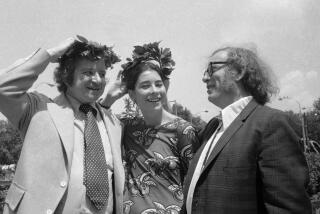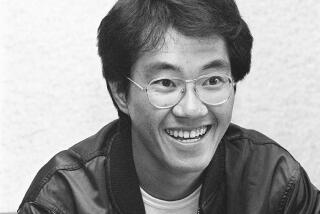Robert Aitken dies at 93; American Zen master
Robert Aitken, an influential American Zen master and writer who emphasized a path to enlightenment through social action, died of pneumonia Thursday in a Honolulu hospital. He was 93.
His death was confirmed by Roland Sugimoto, administrator of Honolulu Diamond Sangha, a Zen Buddhist network with more than 20 affiliated groups around the world that Aitken founded more than 50 years ago with his late wife, Anne Hopkins Aitken.
Aitken was one of the first Americans to be fully sanctioned as a master of Zen Buddhism and trained several generations of Zen Buddhist teachers. He established the Honolulu center as a lay community that was particularly notable for an egalitarian approach that was welcoming to women.
“He made Zen Buddhism workable for Westerners,” said Michael Kieran, who studied under Aitken and now oversees Diamond Sangha’s main temple as master teacher. “He removed a lot of the patriarchal language from the tradition, which had been mainly transmitted to us through the monastic tradition.”
Known for his commitment to social justice, Aitken helped found the Berkeley-based Buddhist Peace Fellowship. He also wrote 13 books, including “Taking the Path of Zen” (1982), a classic primer on Zen practice, and “The Mind of Clover” (1984), a highly regarded exploration of Buddhist ethics.
Born in Philadelphia on June 19, 1917, Aitken moved with his family to Honolulu when he was 5, after his anthropologist father went to work on the staff of the Bishop Museum there. He grew up in Hawaii and California, where he completed high school.
His introduction to Zen came with the outbreak of World War II, when he was a civilian construction worker on Guam. He was captured by Japanese troops in 1942 and spent the duration of the war in an internment camp in Kobe.
In the camp, a Japanese guard lent him a copy of British scholar R.H. Blyth’s “Zen in English Literature and Oriental Classics.” Aitken was fascinated and read the book many times.
After the 10th reading, the world “seemed transparent,” Aitken wrote years later, “and I was absurdly happy despite our miserable circumstances.”
In 1944, when several camps were consolidated in Kobe, he met Blyth, who had been teaching in Japan when he was detained as an enemy alien. Aitken spent the next year in constant conversation with Blyth; and when they were released at war’s end, he decided he would learn meditation under a Zen master.
Aitken returned to Hawaii and enrolled in the University of Hawaii, where he earned a bachelor’s degree in English literature in 1947 and a master’s degree in Japanese studies in 1950. His master’s thesis on the great haiku poet Basho became the basis for his book “A Zen Wave” (1978).
He was working in a bookstore in Los Angeles in the late 1940s when he began to study with Nyogen Senzaki, an itinerant Zen monk who had settled in California in the 1920s. Aitken later went to Japan to train under Nakagawa Soen Roshi, who authorized him to establish a meditation group in his home in Hawaii in 1959. He was ordained in 1974.
Although he was not the first Zen leader to preach social engagement, Aitken was known for his strong commitment to social justice. The “monastery walls have broken down and the old teaching and practice of wisdom, love and responsibility are freed for the widest applications in the domain of social affairs,” he wrote in a 1993 book, “Encouraging Words.”
He counseled draft resisters during the Vietnam War. Earlier, he helped organize chapters of the American Civil Liberties Union and American Friends Service Committee in Hawaii.
Kieran said Aitken was particularly fond of a photograph of himself at a protest holding a sign that read “The System Stinks.”
“He believed in getting out there, holding signs, getting in the way. He was radical in his politics,” Kieran said.
In 1978, Aitken co-founded Buddhist Peace Fellowship with his wife, Anne, and Nelson Foster, who would later succeed Aitken as spiritual leader of Diamond Sangha. The fellowship promotes social activism by Zen Buddhists and has led or participated in prison advocacy campaigns and programs supporting sustainable agriculture in Asia, Tibetan education and human rights in Burma, now called Myanmar.
Aitken’s first marriage, to Mary Laune, ended in 1953. He married Anne Hopkins in 1957; she died in 1994. He is survived by his son from his first marriage, Thomas, and three granddaughters.
More to Read
Start your day right
Sign up for Essential California for the L.A. Times biggest news, features and recommendations in your inbox six days a week.
You may occasionally receive promotional content from the Los Angeles Times.







